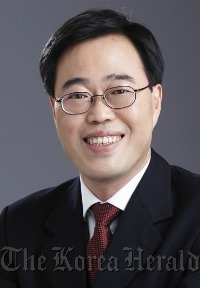The opposition Democratic United Party calls for the strengthening of the equity
investment ceiling as the core of its economic democratization measures, a key
theme in the run-up to this year’s presidential election.
Party Rep. Kim Ki-sik said the regulation had little effect in the past because it was too loose.
A member of the parliamentary finance committee, the former civic activist issued a revision bill of the Fair Trade Act, banning the top 30 conglomerates from investing the equivalent of 25 percent or more of their net assets in other firms.
His is a reinforced version of the party’s, which set a 30 percent ceiling on the top 10 conglomerates.
“My core intention was not to tighten the regulations but to make sure that the law takes its proper effect,” he said.
The top 10 conglomerates will not be much affected by the ceiling system anyway as they are mostly invested as holding companies, according to the lawmaker.
“It is actually those in the upper-middle bracket which tend to expand themselves through cross-shareholding and encroach on the small and medium-sized companies,” Kim said.
“The system would be meaningless without including these firms in the subject range.”
He took the Kumho Asiana Group as an example of such blind spot.
“Kumho brought itself into a liquidity crisis in the past by taking over Daehan Express and Daewoo Engineering & Construction a in 2006,” the lawmaker said.
“Such falls would lead to bad loans and also force the government to provide support funds with taxpayers’ money.”
The group was excluded from the ceiling restriction as it was not among the top 10 conglomerates.
“Some argue that the system goes against international standards, as it only exists here in Korea,” he said.
“But they need to understand that chaebol, or Korean conglomerates, are also unique.”
In no other countries in the world would conglomerates exercise such unlimited power, both economically and socially, he said.
“It is for this reason that some proactive measures must be taken on a state level in order to prevent the irreversible losses of small firms and self-employed businessmen.”
Kim also refuted the argument that the regulations will have a negative effect on the nation’s economy.
“Samsung and Hyundai managed to develop themselves into global organizations even under the equity investment ceiling,” he said.
“What the system does is prevent conglomerate owners from monopolizing the economy.”
The DUP lawmaker criticized the ruling Saenuri Party’s plan to limit the chaebol reform for restricting circular shareholding only.
“The right wing’s idea is to advocate the vested rights of the conglomerates, while pretending to back economic democratization.”
By Bae Hyun-jung (tellme@heraldcorp.com)
Party Rep. Kim Ki-sik said the regulation had little effect in the past because it was too loose.
A member of the parliamentary finance committee, the former civic activist issued a revision bill of the Fair Trade Act, banning the top 30 conglomerates from investing the equivalent of 25 percent or more of their net assets in other firms.
His is a reinforced version of the party’s, which set a 30 percent ceiling on the top 10 conglomerates.
“My core intention was not to tighten the regulations but to make sure that the law takes its proper effect,” he said.
The top 10 conglomerates will not be much affected by the ceiling system anyway as they are mostly invested as holding companies, according to the lawmaker.
“It is actually those in the upper-middle bracket which tend to expand themselves through cross-shareholding and encroach on the small and medium-sized companies,” Kim said.
“The system would be meaningless without including these firms in the subject range.”
He took the Kumho Asiana Group as an example of such blind spot.
“Kumho brought itself into a liquidity crisis in the past by taking over Daehan Express and Daewoo Engineering & Construction a in 2006,” the lawmaker said.
 |
| Rep. Kim Ki-sik of the DUP |
“Such falls would lead to bad loans and also force the government to provide support funds with taxpayers’ money.”
The group was excluded from the ceiling restriction as it was not among the top 10 conglomerates.
“Some argue that the system goes against international standards, as it only exists here in Korea,” he said.
“But they need to understand that chaebol, or Korean conglomerates, are also unique.”
In no other countries in the world would conglomerates exercise such unlimited power, both economically and socially, he said.
“It is for this reason that some proactive measures must be taken on a state level in order to prevent the irreversible losses of small firms and self-employed businessmen.”
Kim also refuted the argument that the regulations will have a negative effect on the nation’s economy.
“Samsung and Hyundai managed to develop themselves into global organizations even under the equity investment ceiling,” he said.
“What the system does is prevent conglomerate owners from monopolizing the economy.”
The DUP lawmaker criticized the ruling Saenuri Party’s plan to limit the chaebol reform for restricting circular shareholding only.
“The right wing’s idea is to advocate the vested rights of the conglomerates, while pretending to back economic democratization.”
By Bae Hyun-jung (tellme@heraldcorp.com)



No comments:
Post a Comment